Ajax Materials Corporation Manages New Plant Build
BY Sandy Lender
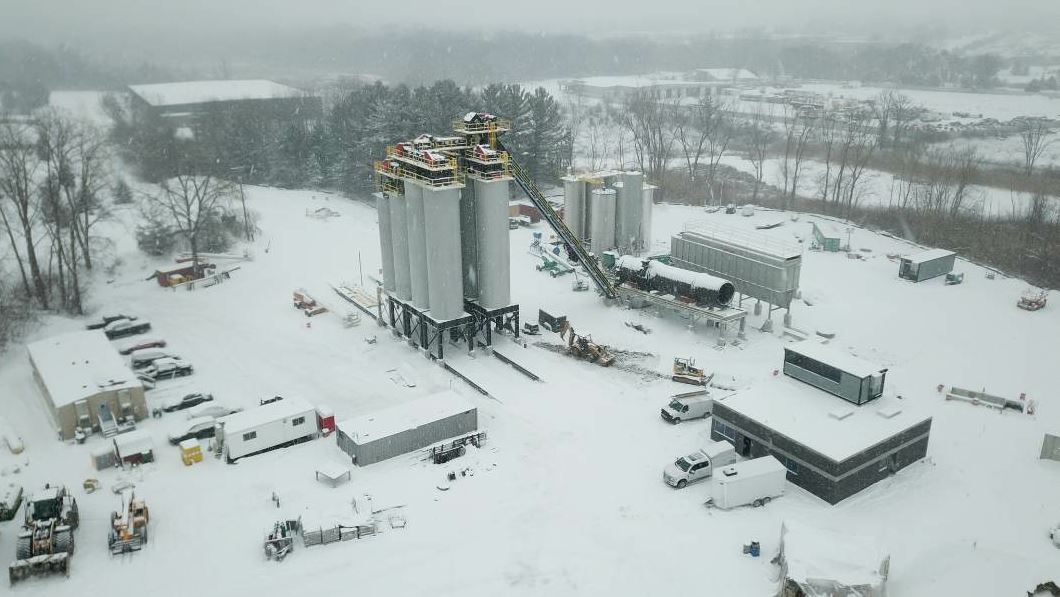
Not every project a contractor takes on involves a paving crew on a highway or rural route. Sometimes a multi-month project moving equipment, earth, mix and materials happens right at the asphalt production site. For example, the team of Ajax Materials Corporation, headquartered near Detroit in Troy, Michigan, offers a case study in how to manage and build a new asphalt plant during the winter with multiple vendors, scads of components and frigid winter temperatures.
Ajax Vice President Mark Boden shared, “Ajax has been in business since 1951. Over the years, we’ve grown from a small paving contractor to a large, fully integrated paving company and materials supplier. We continually upgrade our asphalt plants with the latest technology.”
Boden explained that the Brighton, Michigan, plant was completely replaced with new state-of-the-art asphalt manufacturing equipment after the 2017 paving season and the project required all hands on deck.
Dave Grabowski, the operations manager for Ajax, was the project manager for this undertaking. “Support from upper management was key,” Grabowski said. “Any equipment or service required to get the job done was evaluated and approved by management without delay.”
Travis Mick, the vice president of CWMF, Waite Park, Minnesota, was a key vendor who developed the CAD layout of the site. Boden explained, “CWMF worked with us to lay out the new Brighton plant. That was a huge feather in their cap.” Boden talked about the process’s beginning. “We used aerial views of the property and evaluated all possible layouts. After several iterations, we were rewarded with a really nice layout.”
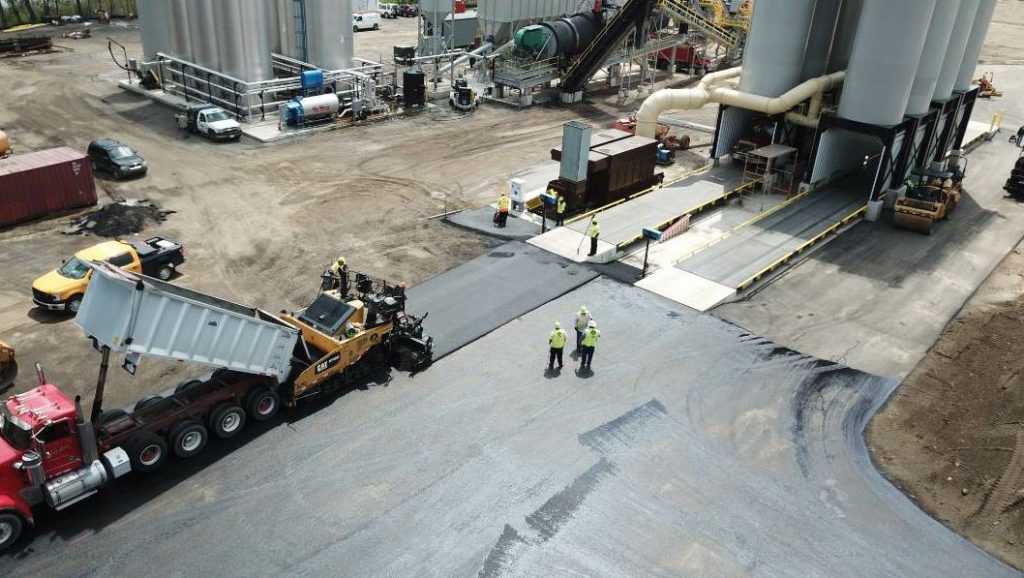
Here you see the crew paving the site with a number of the components visible. The tank farm and piping from Meeker are at the top left; the drum and baghouse from CWMF are at the top right; the blue smoke capture ducts and housing are from Blue Smoke Control, a division of Butler Justice Inc.; and everything will work in concert with the SYSTEMS blend and TSC plant controls installed by Delta Services, who captured and provided this image.
Grabowski takes up the story from there: “That was something else we did with the plant employees. We presented the proposed layouts to them for their opinions. When we get a concept from any vendor, we seek input from our plant personnel because we value their insight and opinions.”
With input from Ajax plant employees, management, CWMF and other vendors, Ajax decided on the optimum layout and was ready to overhaul the Brighton site.
Safe Layout
One of the vital aspects of any Ajax project is safety. Grabowski and Boden discussed this in depth.
“We were very particular about how we designed our truck traffic routes on a ring around the perimeter,” Grabowski said. “Because we started with a clean sheet of paper for the site, we could lay out the plant exactly how we needed to maintain the flow of traffic the way we wanted it for safety and efficiency.”
“Line of sight at this plant is excellent,” Boden agreed.
In fact, line of sight at the Brighton facility impressed the controls installer as well. Dave Enyart Jr., the vice president at Delta Services Corp., provider of SYSTEMS Equipment Corp. controls for the project, shared his thoughts. “The layout of this plant is very well done. The operator has a 360 view of everything from the control tower. We don’t see this often. This layout, combined with the advanced SYSTEMS blend and TSC plant controls that were installed, provide the operator with unparalleled visual and audible indications on the entire plant, allowing the operator to know where the trucks are, where the loader is, and a bird’s eye view of the running plant equipment and plant personnel.
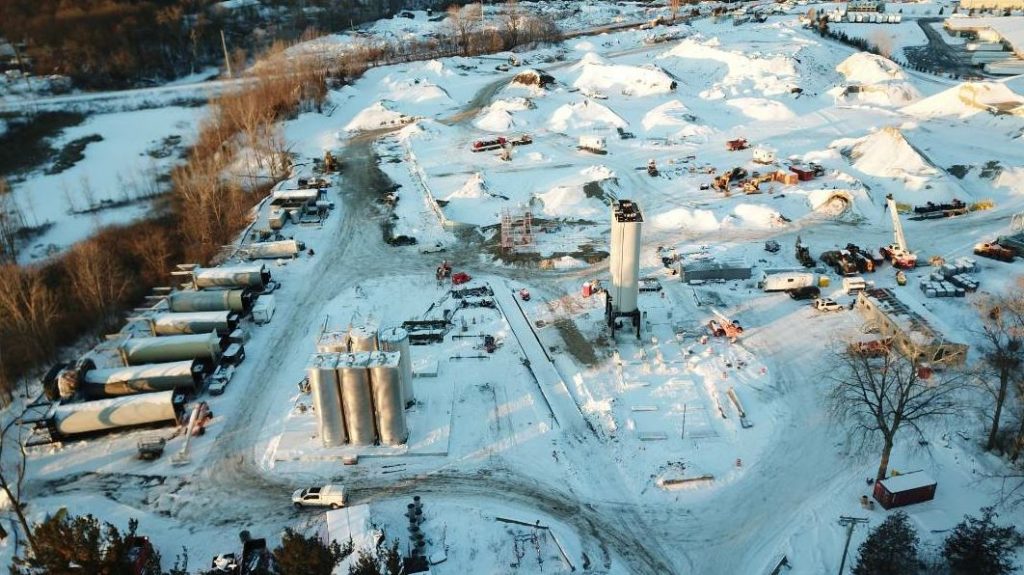
Ajax Materials’ Brighton, Michigan, plant was completely replaced with new state-of-the-art asphalt manufacturing equipment after the 2017 paving season and the project required all hands on deck. Photo courtesy Delta Services
“Let’s say we show an alarm,” Enyart continued. “The operator can look out the window and see exactly what’s going on and what personnel may be in the vicinity. If the screen shows him it’s the feeder that is in error, he can look out and see what’s going on at that feeder, contact appropriate personnel and oversee the process. Without that view, it might take a ground man several minutes to report the problem and find a cause and report that back to the operator.”
The extra safety features Ajax requested of the controls systems, along with the increased visibility, increased plant safety.
Enyart explained Delta Services installed SYSTEMS Equipment’s TSC plant control touchscreen, which gave Ajax more flexibility in the configuration of the safety systems and alarm annunciation. “Ajax wanted more detailed visual indication of the plant safeties,” Enyart said.
“If a conveyor stop switch is tripped, the operator knows which conveyor has an issue while the TSC automatically shuts down the rest of the conveyor line.
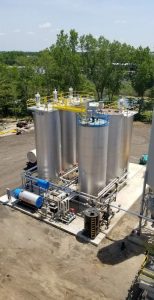
Meeker Equipment, Belleville, Pennsylvania, was consulted during the summer of 2017 to conceptualize the tank farm layout. Steve Meeker shared, “To Ajax’s credit, they were able to make some early decisions with respect to the tanks and plumbing system so that we could deliver and install the tanks and plumbing by early February 2018.” Photo courtesy Meeker Equipment
“For the eight-silo system, Ajax wanted positive proof for which way the flop gates are going. Using the TSC, we gave them additional limit switch indicators and visual indicators on the screens to prove the flop gates have moved to the correct location. We have done the same thing with their six AC tanks. We installed automatic valves with limit switches so we’re proving that the valve is open and proving when the valve is closed.”
At the silos, another vendor installed cameras that Delta Services tied into so the camera feed shows on the screens in the control house. The loadout process is a step above as well. “The operator selects which silo the truck is to go to, which flashes a light and changes the camera view, allowing them to see when the truck is in position,” Enyart explained. “They can then open the safety gate when ready. Additional safety steps are there for their safety and the drivers’ safety as well. When selecting a different silo, all safety gates will close and return the camera system to a
view looking down the loading lanes.”
The Ajax team asked for safety features above and beyond standard operating procedures from CWMF, too. Mick explained: “Ajax takes pride in doing things the right way. In efforts to keep a safe working environment, the equipment was elevated to allow for ease of cleaning and access. We also incorporated service catwalks around all sides of the drums to allow for safe maintenance.”
The team at Meeker Equipment Company, Belleville, Pennsylvania, provided tanks, piping and jacketing, and Steve Meeker spoke about the safety considerations Ajax added in. “While much of the design was somewhat fixed due to the fitting locations of the existing tanks, a generous amount of space was provided between the rows of tanks to make them easily accessible and serviceable.”
That consideration extended to many areas of the site.
“We have a very extravagant conveyor system on top of the silos, but we went over and above such as straps on a barrel ladder just to make sure it’s 100 percent safe up there,” Grabowski said. “The silos have sheeting on the side to capture and evacuate blue smoke so we had four additional cameras installed for 100 percent view of what’s going on at the scales.”
What the team takes pride in is not only the safety worked into the finished site, but the safety record during the project.
“I put up a board to track our progress,” Grabowski said. “We went the entire project without an injury. We had days with 20 people working to days with 60 people on the project for four and a half months.”
And that’s only half the story.
Compress Time
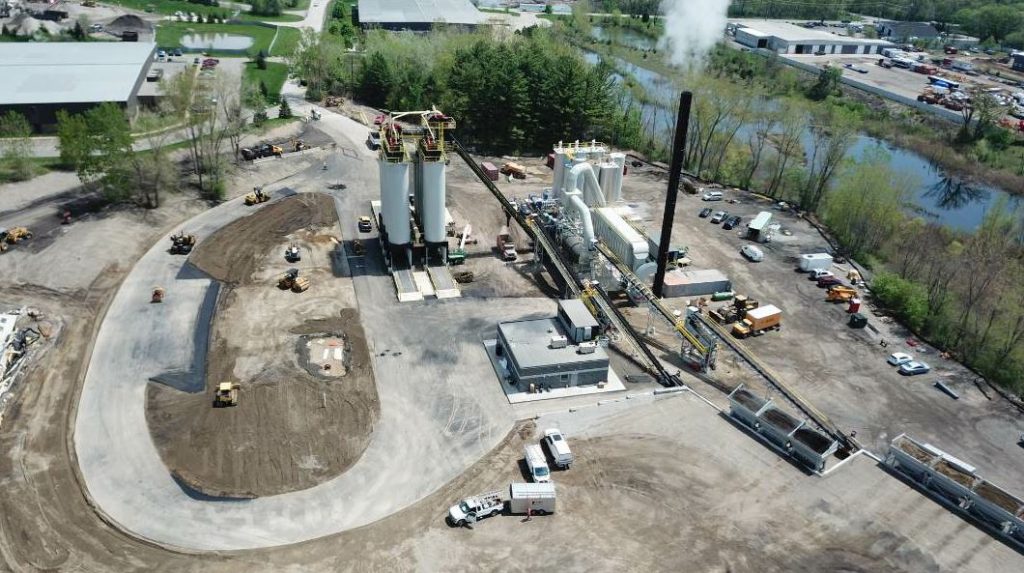
Now that Plant #6 in Brighton is up and running, it offers up to 500 TPH and over 2,000 tons of storage capacity. During the winter of 2018, it produced mix for its own crews to pave the site for dust control and other best practices. Photo courtesy Delta Services
“As far as the compressed schedule, we had a huge US-23 paving project running until the end of November before we could shut down the old plant,” Boden said.
The team was ready.
“Ultimately, they needed to replace their parallel flow technology with counterflow at both facilities,” Mick said. “At the Bald Mountain and Brighton facilities, we supplied a 10-foot, 6-inch by 60-foot drum and 100,000 CFM baghouse package. The 60-foot drum allows for extended drying and mixing times, resulting in high efficiency output. In addition, VFDs were incorporated on the drums for achieving optimal efficiencies with the multitude of mix designs.”
“Our relationship with Ajax started small, just providing parts,” Mick said. “I supplied flighting for their drums to help solve some of their problems in the past, then replaced a drum at the Crooks site. I built a good relationship where they could trust me; I listened to their concerns and needs. The business was built over time.”
When the time came to rebuild the Brighton site, Mick worked with Ajax to put together a layout that guided the rest of the process. The tank farm piece of the puzzle went to Meeker.
“Bill Garrett, Nick Dolyk and I were consulted during the summer of 2017 to generate a conceptual layout of the tank farm,” Steve Meeker explained. “Starting early allowed us plenty of time for budgeting to develop preliminary designs for the project. To Ajax’s credit, they were able to make some early decisions with respect to the tanks and plumbing system so that we could deliver and install the tanks and plumbing by early February 2018. There were multiple meetings reviewing the design of the plumbing system to ensure proper flow of thermal fluid and to ensure that the system was safe and serviceable.
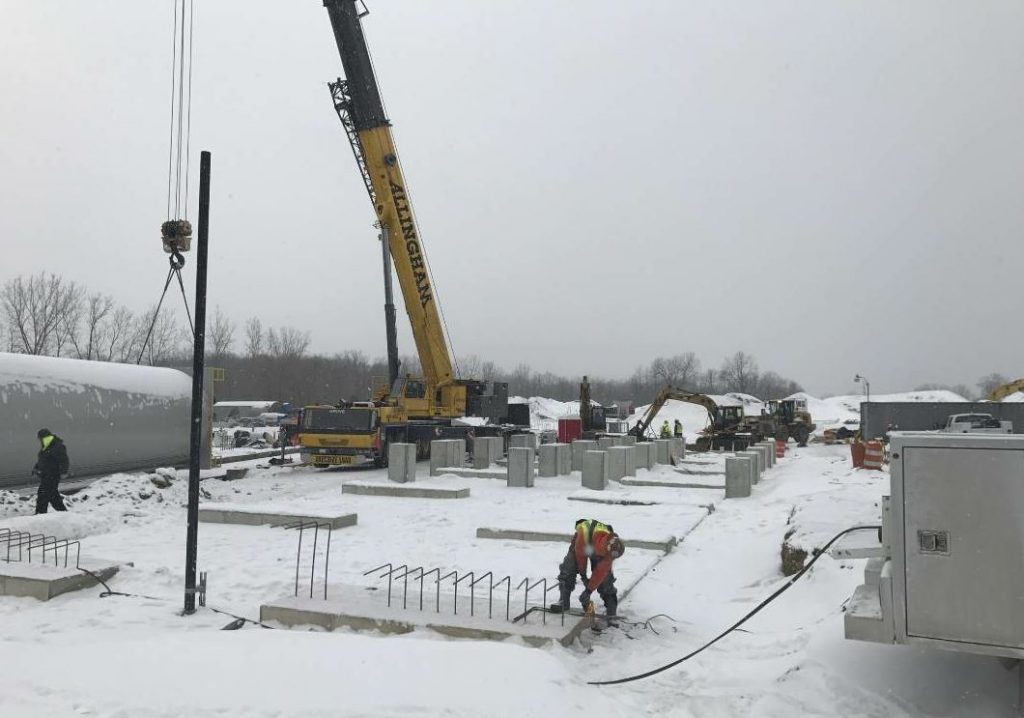
The team sometimes had to heat the ground before pouring concrete to create the forms and footings for plant components. Here the crew gets the silo structure ready. Photos courtesy Ajax Materials
“This was a challenging project as we were tasked with designing a new asphalt and thermal fluid plumbing system for three existing asphalt storage tanks and three new asphalt storage tanks. Meeker Equipment manufactured the three new tanks and one of the existing tanks so drawings were available for four of the six. Given the large number of tanks and considerable asphalt lines that needed to be heated, we elected to design the system with a three-pump manifold and our balanced thermal fluid pumping technology. Incorporating the asphalt and thermal fluid system was not real challenging once the drum and metering skid were located on the drawings and we knew the points we had to connect to.”
Connecting proved challenging due to the weather. It gets mighty cold in Michigan during December and January and so on, as the whole team could attest. They even had to schedule equipment moves around frigid days when frost laws were in effect.

Ajax had a civil engineer in charge of land balancing who helped keep everything on track. Tim Hay is a project manager on the paving side of the company, but “we brought him to this project to serve as civil engineer,” according to Boden. “He took on a lot of the earthmoving,” Boden said. “He took the paving and earth duties.”
“He would check measurements of the forms before we poured concrete bases,” Grabowski said. “There were days when we had to heat the ground before we could pour the concrete. The weather was a huge challenge that Tim met head on.”
“The winter of 2017/2018 was particularly challenging in Michigan with heavy rain and snow,” Meeker concurred. “Ajax worked as the GC pulling all suppliers’ responsibilities together to make the entire plant. From our end, we had some plant connections to hit and some controls tie-ins and that part went smoothly. The biggest benefit of working with Ajax is their ability to commit early to a project. Proper time allotted and planning helped make our piece of the project a success.”
“I’m proud of the teamwork and safety that went into building this plant under the worst winter conditions I’ve ever seen,” Boden said.
The team included upper management and ground personnel all along the way. “Vince Iafrate is our maintenance manager,” Grabowski said. “He covers all the bases and was an invaluable part of this project.”
Both Boden and Grabowski spoke of Chris Edwards, a new employee in 2017/2018, who “was onsite continually. A major part of this project included a new lab, scale control center, tool room and operator’s control room all housed within one building, and Chris helped to track tasks and schedules to help keep the project on time.”
Boden mentioned the vital role Kathleen Anderson, the Ajax environmental manager, played in the Brighton project. “Kathleen handles all our environmental issues and was instrumental with project permits and helping the team with whatever else was needed.”
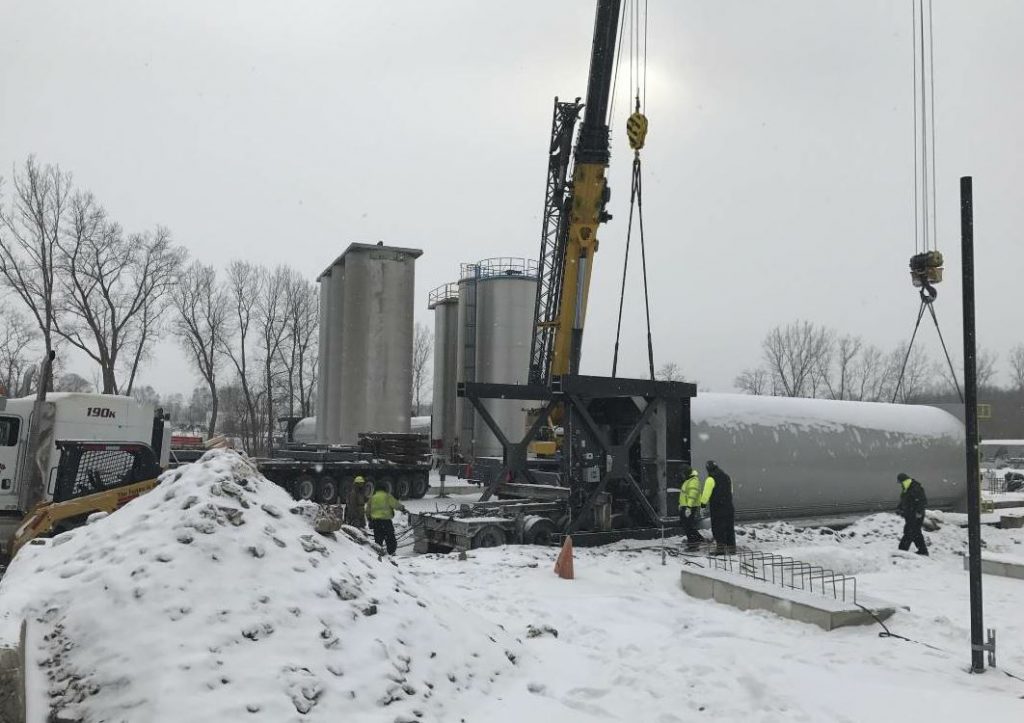
With footings in place and cured, the crew could erect the silos, even in the snow. Photo courtesy Ajax Materials
The Ajax Materials team was rounded out by a dedicated group of employees who decided to forego their typical winter break and work on this special project. They included Steve Niefert, Mike Herzfeld, Chuck Goff and Nick Armbruster. Support was also provided by Brandon Fuller, Kelly Schwall and Justin Mclachlan to create an efficient and functional testing lab. In addition, approximately 35 Ajax Paving employees, including Randy Deer, Jose Galindo, Joe Guigar and Paul Resky, provided important equipment operation and support labor.
From step one to the final step, the whole team brought a massive undertaking together in less than five months—within budget and in time for spring 2018 startup. Enyart bragged on their efficiency.
“The size of the project was the same as a plant in Wisconsin that took nine months, and they ended up with the latest technologies like VFDs on the drag slats, dryers and so on. It’s going to help them with their energy consumption, with their production, and with their maintenance. Over time, that’s going to be a big payoff for them.”
On a blank sheet of paper, the payoff can be written down in numbers, tons per hour or environmental goals. But a safe project delivery goes a long way toward the Ajax company philosophy. Ajax has remained a family owned business since Founder Herb Jacob opened its doors in Madison Heights, Michigan, in 1951. The company’s philosophy was then, and is today, to value its employees and dedication to a job well done.
Now the company has six modern, high-capacity hot-mix asphalt plants in Michigan and eight mobile concrete plants performing work in multiple states. Ajax of Florida has seven asphalt plants and is a foremost paving company in its region. This lets them provide material for high-end, high-spec paving projects over a wide geographic area. The company’s website states: “In more than 66 years of operation, we have paved thousands of miles of highways; repaved and reconstructed numerous race tracks and test track facilities for industry leaders including the Michigan International Speedway, Phoenix International Raceway, Chrysler Group Chelsea and Chrysler Arizona proving grounds, General Motors, Ford Michigan Proving Ground; and built the runways for major metropolitan airports including Detroit Metropolitan, Tampa International, Gerald R. Ford International and Fort Wayne International Airports.”

